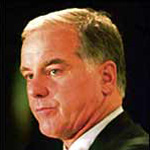By Andy Potter
Published March 1st 2009 in WCAX News
A four-way race for mayor of Burlington is coming down to the wire, and the contest seems so close that hardly anyone is willing to call the result. But it's worth taking a look at the rough and tumble history of the city's politics and how things have changed.
It was March 1, 1983. Bernie Sanders had just been re-elected mayor for a second two-year term, meaning his initial election in 1981 was no fluke. Sanders' first victory led to a bitter confrontation with his political rivals. Opponents on the council had even refused to confirm his top city hall appointments.
Alderman Joyce Desautels declared from her seat at the council table at the time, "I cannot support your nominations, Mr. Sanders, because it is a method of expanding the base of the socialist party in the City of Burlington." Her words drew loud applause.
It would never get more bitter, but there would be many more fights among three warring factions -- the newly-empowered Progressives, the Democrats and the Republicans. But now, nearly thirty years later, as four major candidates for mayor are about to face off on election day, the highly-charged confrontational politics of the past is mostly a memory. "I would say that the tri-partisan split that has defined Burlington politics for most of past generation doesn't quite fit in this time," said Garrison Nelson, a UVM Political Scientist who has followed Burlington politics since the 1970s.
Nelson says Mayor Bob Kiss and his three major challengers, Republican Kurt Wright, Democrat Andy Montroll and Independent Dan Smith, reflect a lower level of confrontation because Burlington politics have mellowed. "The Democrats are now much more liberal than they ever were before," he said, "and the Progressives are now much more establishment than they ever were. And so consequently, we don't really have a clear tri-party system."
Also working against strong political divisions is Instant Runoff Voting, in which voters rank the candidates. None of the contenders wants to be too hard on an opponent for fear of turning off potential second-rank votes. So if ideology doesn't count as much, what does?
Nelson said, "I think basically we're dealing with a clear generational phenomenon and we are now once again seeing the politics of personality play out. And the stronger personality presumably should win."
The politics may have mellowed but one thing hasn't changed. There remains a high level of interest in the mayor's race inside and outside of Burlington. A lot of people will be watching the results Tuesday night.
 On March 16th, Former Vermont Governor and Democratic National Committee Chair Howard Dean continued his support for instant runoff voting on Vermont Radio's Mark Johnson Show. Commenting on Burlington's recent IRV election, Dean said "I think the best and most democratic way to use to elect people in multiparty elections is instant runoff voting." Dean also supported the system when it was first used in Burlington in 2006.
On March 16th, Former Vermont Governor and Democratic National Committee Chair Howard Dean continued his support for instant runoff voting on Vermont Radio's Mark Johnson Show. Commenting on Burlington's recent IRV election, Dean said "I think the best and most democratic way to use to elect people in multiparty elections is instant runoff voting." Dean also supported the system when it was first used in Burlington in 2006. Citizens of Burlington, Vermont went to the polls on Tuesday, March 3rd to vote for the second time in an election using instant runoff voting. At 8:25 PM, the city declared that incumbent Mayor Bob Kiss had won reelection in the third and final round of counting, narrowly edging out challenger Kurt Wright, 51.5% to 48.5%. The race was unique in that it had four candidates that had a legitimate shot at winning: Progressive Kiss, Republican Wright, Democrat Andy Montroll, and independent Dan Smith. In most other American cities, there would be fear of "spoiler" candidates, but IRV allowed all four candidates to run without having to worry about being labeled "spoilers."
Citizens of Burlington, Vermont went to the polls on Tuesday, March 3rd to vote for the second time in an election using instant runoff voting. At 8:25 PM, the city declared that incumbent Mayor Bob Kiss had won reelection in the third and final round of counting, narrowly edging out challenger Kurt Wright, 51.5% to 48.5%. The race was unique in that it had four candidates that had a legitimate shot at winning: Progressive Kiss, Republican Wright, Democrat Andy Montroll, and independent Dan Smith. In most other American cities, there would be fear of "spoiler" candidates, but IRV allowed all four candidates to run without having to worry about being labeled "spoilers." On April 4, Vermont governor Jim Douglas chose to veto legislation to re-establish majority elections for Congress in his state through instant runoff voting. Vermont would have been the first state to enact IRV for Congress; legislative leaders affirmed their commitment to the bill, and it is sure to move in the state again. FairVote has worked hard to support this legislation, which likely generated more than 600 phone calls to the governor from Vermonters.
On April 4, Vermont governor Jim Douglas chose to veto legislation to re-establish majority elections for Congress in his state through instant runoff voting. Vermont would have been the first state to enact IRV for Congress; legislative leaders affirmed their commitment to the bill, and it is sure to move in the state again. FairVote has worked hard to support this legislation, which likely generated more than 600 phone calls to the governor from Vermonters.